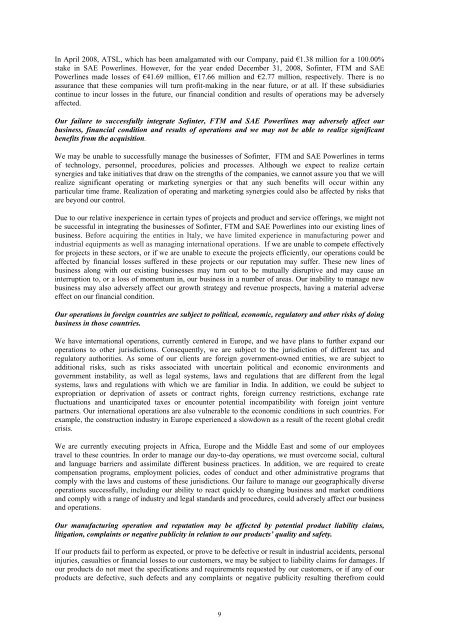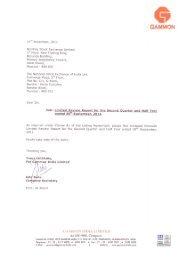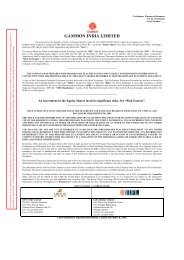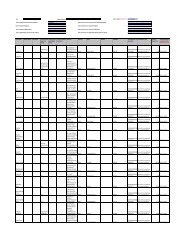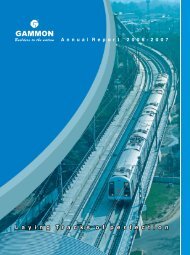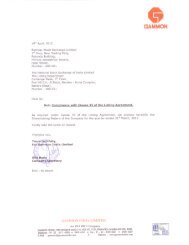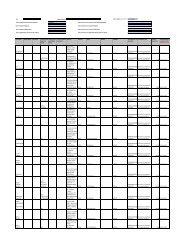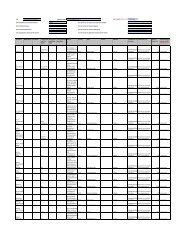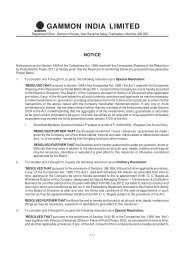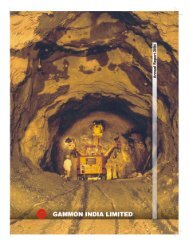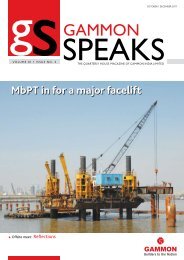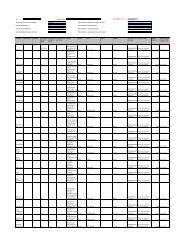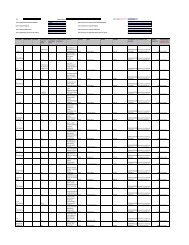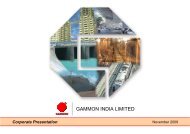GAMMON INDIA LIMITED
GAMMON INDIA LIMITED
GAMMON INDIA LIMITED
Create successful ePaper yourself
Turn your PDF publications into a flip-book with our unique Google optimized e-Paper software.
In April 2008, ATSL, which has been amalgamated with our Company, paid €1.38 million for a 100.00%<br />
stake in SAE Powerlines. However, for the year ended December 31, 2008, Sofinter, FTM and SAE<br />
Powerlines made losses of €41.69 million, €17.66 million and €2.77 million, respectively. There is no<br />
assurance that these companies will turn profit-making in the near future, or at all. If these subsidiaries<br />
continue to incur losses in the future, our financial condition and results of operations may be adversely<br />
affected.<br />
Our failure to successfully integrate Sofinter, FTM and SAE Powerlines may adversely affect our<br />
business, financial condition and results of operations and we may not be able to realize significant<br />
benefits from the acquisition.<br />
We may be unable to successfully manage the businesses of Sofinter, FTM and SAE Powerlines in terms<br />
of technology, personnel, procedures, policies and processes. Although we expect to realize certain<br />
synergies and take initiatives that draw on the strengths of the companies, we cannot assure you that we will<br />
realize significant operating or marketing synergies or that any such benefits will occur within any<br />
particular time frame. Realization of operating and marketing synergies could also be affected by risks that<br />
are beyond our control.<br />
Due to our relative inexperience in certain types of projects and product and service offerings, we might not<br />
be successful in integrating the businesses of Sofinter, FTM and SAE Powerlines into our existing lines of<br />
business. Before acquiring the entities in Italy, we have limited experience in manufacturing power and<br />
industrial equipments as well as managing international operations. If we are unable to compete effectively<br />
for projects in these sectors, or if we are unable to execute the projects efficiently, our operations could be<br />
affected by financial losses suffered in these projects or our reputation may suffer. These new lines of<br />
business along with our existing businesses may turn out to be mutually disruptive and may cause an<br />
interruption to, or a loss of momentum in, our business in a number of areas. Our inability to manage new<br />
business may also adversely affect our growth strategy and revenue prospects, having a material adverse<br />
effect on our financial condition.<br />
Our operations in foreign countries are subject to political, economic, regulatory and other risks of doing<br />
business in those countries.<br />
We have international operations, currently centered in Europe, and we have plans to further expand our<br />
operations to other jurisdictions. Consequently, we are subject to the jurisdiction of different tax and<br />
regulatory authorities. As some of our clients are foreign government-owned entities, we are subject to<br />
additional risks, such as risks associated with uncertain political and economic environments and<br />
government instability, as well as legal systems, laws and regulations that are different from the legal<br />
systems, laws and regulations with which we are familiar in India. In addition, we could be subject to<br />
expropriation or deprivation of assets or contract rights, foreign currency restrictions, exchange rate<br />
fluctuations and unanticipated taxes or encounter potential incompatibility with foreign joint venture<br />
partners. Our international operations are also vulnerable to the economic conditions in such countries. For<br />
example, the construction industry in Europe experienced a slowdown as a result of the recent global credit<br />
crisis.<br />
We are currently executing projects in Africa, Europe and the Middle East and some of our employees<br />
travel to these countries. In order to manage our day-to-day operations, we must overcome social, cultural<br />
and language barriers and assimilate different business practices. In addition, we are required to create<br />
compensation programs, employment policies, codes of conduct and other administrative programs that<br />
comply with the laws and customs of these jurisdictions. Our failure to manage our geographically diverse<br />
operations successfully, including our ability to react quickly to changing business and market conditions<br />
and comply with a range of industry and legal standards and procedures, could adversely affect our business<br />
and operations.<br />
Our manufacturing operation and reputation may be affected by potential product liability claims,<br />
litigation, complaints or negative publicity in relation to our products’ quality and safety.<br />
If our products fail to perform as expected, or prove to be defective or result in industrial accidents, personal<br />
injuries, casualties or financial losses to our customers, we may be subject to liability claims for damages. If<br />
our products do not meet the specifications and requirements requested by our customers, or if any of our<br />
products are defective, such defects and any complaints or negative publicity resulting therefrom could<br />
9


